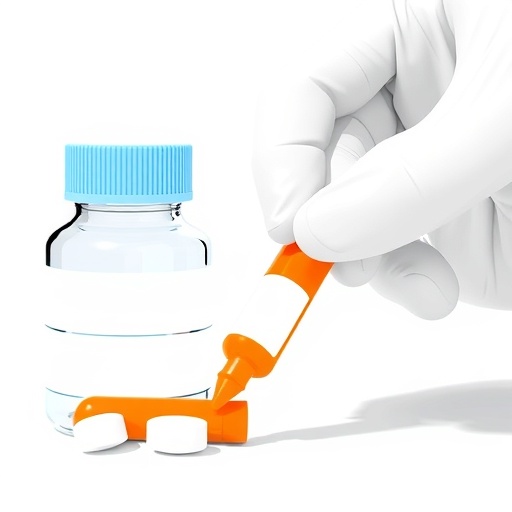In a groundbreaking study, researchers have put forth a compelling argument for the implementation of pharmacy-dispensed methadone as a critical mechanism in addressing opioid use disorder (OUD) in the United States. With opioid addiction at alarming levels, the study highlights the urgent need for a multifaceted approach that leverages the accessibility and resources of local pharmacies. The authors, led by Z.M. Weinstein alongside co-authors J. Bratberg and P.J. Joudrey, argue that incorporating pharmacies into the treatment landscape can bridge gaps in care, reduce stigma associated with seeking treatment, and ultimately save lives.
Opioid use disorder is a pervasive public health crisis that has increasingly drawn the attention of medical professionals, policymakers, and the general public alike. The intricacies involved in treating OUD involve a combination of pharmacological therapies, behavioral interventions, and societal support structures. Nonetheless, barriers to accessing effective treatment systems often hinder patients from receiving the help they need. Therefore, the idea of providing methadone through pharmacies could serve as a vital solution.
The main advantage of utilizing pharmacies for medication-assisted treatment (MAT) lies in their widespread presence and accessibility. Pharmacies are the most common healthcare point of contact for individuals, often providing a more approachable environment compared to traditional clinics or hospitals. This study posits that by allowing pharmacies to dispense methadone, patients may feel a reduced sense of stigma or fear related to their OUD, encouraging more individuals to seek the necessary treatment.
Research has consistently demonstrated that methadone can significantly increase the chances of recovery for individuals battling opioid addiction. This opioid agonist works by binding to the same receptors in the brain as other opioids, effectively reducing cravings without producing the euphoric highs that frequently lead to substance misuse. By integrating methadone dispensation into pharmacy operations, the researchers assert that it could optimize treatment accessibility and outcomes for patients.
However, implementing such a project is not without its own set of challenges and requirements. The study suggests that policymakers must consider various regulatory frameworks governing the dispensing of controlled substances. Ensuring that pharmacy staff is adequately trained in addiction treatment principles and safe medication dispensing is vital. This training would help mitigate the risk of misuse while also providing necessary support to users.
Moreover, fostering collaborations between pharmacies and healthcare providers is paramount. By adequately communicating and sharing responsibility, pharmacies can become a part of a broader support network for OUD patients. Integrating pharmacies into health care teams can enable a holistic approach that includes medication management, counseling, and follow-up care as part of a more structured and effective treatment plan.
Concerns about the safety and effectiveness of having non-specialized healthcare providers dispense methadone are prevalent. However, the authors argue that with comprehensive training, pharmacists can possess the necessary knowledge and skills to handle such responsibilities appropriately. Existing models such as naloxone dispensing have already demonstrated success in reducing overdose deaths, illustrating a potential path forward for methadone distribution.
Additionally, the study emphasizes the significance of public education campaigns. Informing the community about the benefits of pharmacy-dispensed methadone could mitigate reservations and misconceptions surrounding its use. Public awareness can play a pivotal role in changing perceptions, which could lead to an increased willingness to engage with treatment options.
The potential impact of this study extends beyond individual treatment experiences; it may influence public health policy on a national level. By recognizing pharmacies as influential players in OUD treatment, health policymakers may implement structural changes to accommodate this new approach. Furthermore, pharmacies could become more engaged in health outcomes, ensuring they are seen not just as medication dispensers but as key healthcare providers within the community.
As part of a comprehensive public health strategy, the proposed actions surrounding pharmacy-dispensed methadone may move the United States closer to combating the opioid epidemic effectively. Investment in research initiatives, training programs, and community-based strategies will be essential for realizing the vision the researchers have laid out. By actively involving pharmacies, the nation can take significant steps toward reducing the overdose crisis and improving the quality of life for those affected by OUD.
In conclusion, the findings from Weinstein, Bratberg, and Joudrey’s study articulate a clearer path forward in the fight against opioid addiction. Greater integration of pharmacies into the treatment of OUD through controlled methadone distribution could offer a lifeline to many who might otherwise remain unreachable. The study positions itself as a call to action for a concerted effort among healthcare providers, pharmacies, and policymakers, all of whom must work together to tackle this pervasive issue head-on.
As the opioid epidemic remains a critical and pressing concern, innovative solutions like these warrant immediate attention and action. Our collective response must exceed the scope of traditional approaches to effectively address this crisis. Through the careful consideration of integrating pharmacies into addiction treatment, we may finally find the means needed to bring solace to countless individuals and families ravaged by opioid dependence.
Subject of Research: The role of pharmacy-dispensed methadone in treating opioid use disorder.
Article Title: Actions Needed for Pharmacy-Dispensed Methadone for Opioid Use Disorder in the United States.
Article References:
Weinstein, Z.M., Bratberg, J., Joudrey, P.J. et al. Actions Needed for Pharmacy-Dispensed Methadone for Opioid Use Disorder in the United States.
J GEN INTERN MED (2025). https://doi.org/10.1007/s11606-025-10035-5
Image Credits: AI Generated
DOI: https://doi.org/10.1007/s11606-025-10035-5
Keywords: Pharmacy, Methadone, Opioid Use Disorder, Public Health, Medication-Assisted Treatment.




